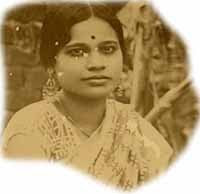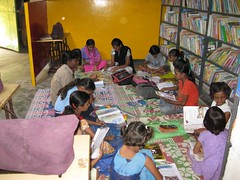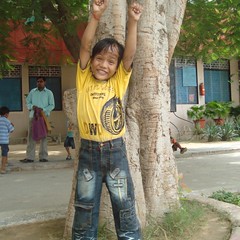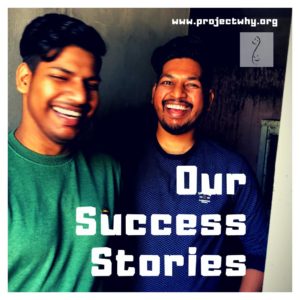
by Anuradha Bakshi | Oct 15, 2009 | manu
 A couple of months back I got a mail from Denmark. It was from a high school teacher and simply said: We have with great interest read about your Project Why. My colleague and I are going to New Delhi in October with a group of 23 students. For a long time they have been working with social and political conditions in India. In that connection it would be very interesting and relevant for the students to visit your project and talk to one of your representatives.
A couple of months back I got a mail from Denmark. It was from a high school teacher and simply said: We have with great interest read about your Project Why. My colleague and I are going to New Delhi in October with a group of 23 students. For a long time they have been working with social and political conditions in India. In that connection it would be very interesting and relevant for the students to visit your project and talk to one of your representatives.
The idea of having 25 people at project why was daunting. Project why was such a tiny place, where would we fit so many people. Nevertheless I wrote to say they were welcome. As the visit was still some weeks away we somehow forgot about it. Last week another mail informed us of the impeding arrival of our young visitors.
On Monday morning as the clock struck 9, the young students and their two teachers reached project why. I must admit that 25 young people take a lot of place. They wanted me to present project why and we decided to move across the street to the foster care as there was a little more place there, or so it seemed. Soon we were all packed in a room. I had thought of giving then a short presentation and then send them to visit some of our centres but somehow the eagerness of these young souls made me tell the the project why story as I had lived it, straight from the heart. I spoke for a long time recalling small details. They listened almost mesmerised. As the story went on and we talked of Manu I could see a few hands surreptitiously wiping a tear. When I had finished there were many moist eyes and they has still not seen the project or met the children. I must admit I was taken aback and moved.
It was then time to start the visit and the first stop was at the special section. Shamika introduced the children to them and told them each one’s story. Soon the tears turned to sobs. Many of the young students were crying unabashedly. Many were surprised but I was not as I understood that they were looking with their hearts.
I wondered what touched these young people who came from the land of the plenty? Was it that suddenly all they had taken for granted till now seemed undeserved? I do not know. All I knew was that nothing would ever be the same for these young persons.
Seeing with your heart can be dangerous as it may entail unexpected changes in your life, changes you did not anticipate, changes that could make you a different person altogether. Perhaps that is why many of us resist seeing with our hearts.

by Anuradha Bakshi | Oct 14, 2009 | Uncategorized
 Ray Kurzweil, the futurist recently predicted that in 20 years or so we might reach a stage where we could live forever, and even become ageless and immortal. What a frightening thought. Does it not make the meaning of our lives futile. Are purpose and achievement not linked to the simple fact that we are mortal, and hence have just that much time. Living forever would be like not living at all. One would simply be frozen in time.
Ray Kurzweil, the futurist recently predicted that in 20 years or so we might reach a stage where we could live forever, and even become ageless and immortal. What a frightening thought. Does it not make the meaning of our lives futile. Are purpose and achievement not linked to the simple fact that we are mortal, and hence have just that much time. Living forever would be like not living at all. One would simply be frozen in time.
Why I am writing about such issues today. Simply because today the one who gave me the gift of life would have celebrated her 92nd birthday. And no one loved life more than her. Even when she was dying of cancer, this remarkable woman refused any palliative care that may have anaesthetised her as she wanted to live till the last second of her life, a life that she had ensured had been worth living. Kamala was an ordinary girl from a small town. She should have lived an ordinary life and died an ordinary death. But she chose otherwise. She fought to be educated and was the first in her town to do so. She eventually got a PhD. She fought social mores and got married in her thirties as she did not want to bring a slave child into this world and thus not marry before India’s Independence. At a time when girls were mothers before becoming women, she chose to work to defend women’s rights in remote villages where she reached driving a truck. And when she did marry, the ordinary small town girl became a diplomat’s wife set to conquer the whole world.
Yes mama was an extraordinary woman. One who lived life to its fullest. And yet she did so because she knew life was a given gift but not an eternal one; that time was short and that you never really got a second chance. She wanted to leave her mark in whatever small way possible. Se did it her way.
Any notion of supposed immortality would rob us of the desire to achieve and do something so that we too would be remembered after our final curtain call. Life derives its very purpose from the very notion that it is limited and transient. Immortality would take away the very essence of life.
Today I remember the one who gave me life.
Meet Kamala here.

by Anuradha Bakshi | Oct 14, 2009 | Uncategorized
 In India a child dies every 15 seconds due to neonatal diseases, and 2 million children die before reaching their fifth birthday, 20% of the world’s child death occurs in India, one in three of all malnourished children live in India, over 46% of children under three are underweight in India… over 28% of child’s deaths are linked just to poor sanitation and unsafe drinking water. These startling and shocking figures are from the recently released Save the Children “Every One” report.
In India a child dies every 15 seconds due to neonatal diseases, and 2 million children die before reaching their fifth birthday, 20% of the world’s child death occurs in India, one in three of all malnourished children live in India, over 46% of children under three are underweight in India… over 28% of child’s deaths are linked just to poor sanitation and unsafe drinking water. These startling and shocking figures are from the recently released Save the Children “Every One” report.
I sat stunned as I read these figures. This was happening in a country where a 4 bedroom flat is rented at half a million rupees, a vintage bottle of wine sold at 50K ; where millions are spent on flowers for a wedding, where food is thrown in the garbage after nights of revelry, where gallons of milk are poured on deities. This was happening in a land where shopping malls are erected everyday, where shoes and bags can cost more ten times more than what 75% of India’s population earns in a year.
Austerity is the flavour of the hour. Heated debates are held on whether those in power should fly in one class or another. Absurd reasons are given to justify each one’s view and while all this is happening a child is dying every 15 second. Everyday new policies are announced amidst much fanfare. Every day new programmes are heralded to supposedly alleviate poverty. And yet children are dying simply because of unavailability of safe drinking water.
Missions are organised to conquer space, to reach the moon. Whoops of joy are heard because water has been found on the lunar surface but here children still die for the simple lack of it. Something is terribly wrong.
Every child, no matter where or to whom it is born has the right to live. And each and everyone of us have a moral responsibility to ensure that it happens. We must act and act now. We cannot turn our faces away or pretend that we cannot see or hear. The figures mentioned above were recently published in a national daily. How many of us read them and just moved on. I do not know. I can only say that they got seared in my soul and spirit. Things could never be the same again. Whatever one thought one had achieved suddenly seemed inconsequential. There was a sudden need to review, reassess, rethink everything and start all over again.
A child dies every 15 second in India and I hang my head in shame.

by Anuradha Bakshi | Oct 10, 2009 | women centre
 Megha visited the women centre some time back. She needed to write a blurb for potential donors. This is what she wrote:
Megha visited the women centre some time back. She needed to write a blurb for potential donors. This is what she wrote:
Situated among the squalid gallis of Madanpur Khader village in South Delhi is located the Women’s Centre; one of the 13 centers operated by our project in the slums of New Delhi.
Unlike other centres of the project, this one is self contained in several ways. Led by Dharmendra, a man as charismatic as his film-star namesake, this centre has after school education programs for children from 1 – 8 standard, sewing and beautician courses for young women, a computer centre and a small apartment complex complete with kitchen for battered or abandoned women.
As I visited the centre, narrowly missing being swooshed in the face by a buffalo’s tail, it was a relief to step into the neat library space of the women’s centre. Young women were busy learning how to sow in a straight line, the creche was wrapping up and Meher, a child who fell into boiling hot water was being nursed after her plastic surgery to open the digits on her hands.
Dharmendra-ji invited us into his small office, offered a cup of tea and spoke about the previous year. Each time I meet him his stories amaze me; mostly because of the innovative solutions he finds to most mundane problems. The Centre opened about a year ago and one of the fastest growing aspects has been library usage. This was so popular with the children that Dharmendra-ji kept it open on Sundays, effectively giving himself a 7 day work week.
A few months ago, some books went missing. Dharmendra-ji had an idea who had stolen them but did not want to embarrass the child in front of his peers so he declared that no-one would have access to the library unless the books returned. Upset that they may not be able to use the library, the children then took initiative to organize themselves into vigilant squads. Bags were searched; entry and exists carefully monitored. And just like that, a few days later the books returned. Dharmendra-ji created a situation where the children valued a service enough that maintaining it gave them pride; so now, its the children who manage the lending and reading activities in the library giving themselves ownership of this service.
Overall, this centre is so popular that he now keeps a waiting list for students wishing to join the after school program. This is what you donor money is doing right now – quenching children’s thirst for education in a safe and loving environment!

by Anuradha Bakshi | Oct 7, 2009 | commonwealth games
 I do not quite know why but I was interviewed by CTV (Canadian Televison) on my views about the forthcoming Commonwealth games. Perhaps it is because time and again I have voiced my concern over destruction of slums and the removal of street food vendors all done in the name of the CG! It was an odd feeling to be sitting on this side of the fence, when 27 years ago I sat on the other as head protocol for the IX Asian Games village. But that was way before project why, at a time when I like many others, was almost blissfully unaware of the other side of the fence. Then the Games were a matter of pride and had to be run successfully. Today was another story.
I do not quite know why but I was interviewed by CTV (Canadian Televison) on my views about the forthcoming Commonwealth games. Perhaps it is because time and again I have voiced my concern over destruction of slums and the removal of street food vendors all done in the name of the CG! It was an odd feeling to be sitting on this side of the fence, when 27 years ago I sat on the other as head protocol for the IX Asian Games village. But that was way before project why, at a time when I like many others, was almost blissfully unaware of the other side of the fence. Then the Games were a matter of pride and had to be run successfully. Today was another story.
Till this interview I had not really given thought to what the Games really meant to me. As any other citizen of Delhi I felt irked by the constant traffic diversions at construction sites; as someone who was somewhat environment conscious I felt enraged at the Games village being constructed on the flood plain of Yamuna. All in all I never felt good about the Games. But it is only when I had to gather my thoughts for the interview that I realised what the Games really meant to me today. I think what disturbed me the most was the lost of livelihood that the sprucing up of the city entailed and that because many of the parents of the pwhy kids were food cart owners. The recent cleaning up drive has meant that they have lost their only means of earning. It is true that the court order banning the sale of cooked food was meant to curb the enormous bribes that were being paid, but once again it is the victim that was punished and not the perpetrator. The aftermath is yet to be felt as many are still hoping that like always this will be a temporary measure. Alas that does not seem to be the case.
The end of food carts also spells the end of an age old tradition and somehow that is something difficult to swallow. Are the famed Games going to change the very ethos of our existence. Sad but true!
What else are we going to brush under the carpet. I guess what comes to mind are the beggars in the city. I am sure they will be rounded up for the duration of the games and then let free again. I would have been elated if the Games had been the reason for addressing problems and finding long term solutions. Maybe one should have started a campaign urging people not to give money to beggars as that is the only way beggary would end: the day it becomes not profitable. My mind goes back to the little beggar girl.
I wish the Games would mean the end of pot holes on Delhi’s roads. I wish the Games would mean a more efficient garbage disposal system.. I wish… the list is endless. But we got a taste of what the Games are going to mean to the Delhizen. Yesterday the CG Committee was on a visitation to assess the degree of preparedness of the city. The authorities came up with yet another cover up scheme: all the roads leading to the main event venues were simply blocked. The committee whizzed from one venue to another while ordinary citizens spent gruelling hours on choker block roads for their daily commute.
Brace yourself, CG times are not going to be easy or should I say be prepared for common woes!

 A couple of months back I got a mail from Denmark. It was from a high school teacher and simply said: We have with great interest read about your Project Why. My colleague and I are going to New Delhi in October with a group of 23 students. For a long time they have been working with social and political conditions in India. In that connection it would be very interesting and relevant for the students to visit your project and talk to one of your representatives.
A couple of months back I got a mail from Denmark. It was from a high school teacher and simply said: We have with great interest read about your Project Why. My colleague and I are going to New Delhi in October with a group of 23 students. For a long time they have been working with social and political conditions in India. In that connection it would be very interesting and relevant for the students to visit your project and talk to one of your representatives.










